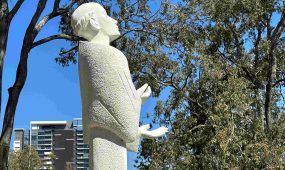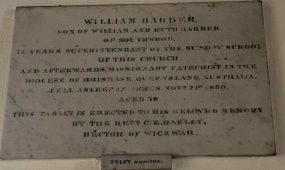The life and legacy of trailblazing social reformer and evangelical Anglican Josephine Butler
People & History
“Josephine Butler can teach us to be courageous and faithful in standing up for the truth and the rights of those who are oppressed. She can show us how to combine compassion and action, and how to use our gifts and talents for God’s glory,” writes The Rev’d Tania Eichler, as Josephine Butler is commemorated in our Lectionary on 30 December

Born on 13 April 1828 in Northumberland, and later raised in the region, Josephine Butler was an English feminist and social reformer in the Victorian era. She campaigned for women’s suffrage, the right of women to better education, the end of coverture in British law, the abolition of child prostitution, and an end to human trafficking of young women and children into European prostitution.
A leading evangelical Anglican, Butler was motivated by her Christian faith and her compassion for people who are oppressed and marginalised. She demonstrated the Christian belief that all people are created in the image of God with inherent dignity and thus deserving of respect. She also saw her work as a way of fulfilling Jesus’ great commission to make disciples of all nations.
Advertisement
Writing in The Guardian, journalist and author Julie Bindel notes, “A committed Christian, Butler believed that ‘everyone is equal under God’, and became appalled at how women in prostitution were treated…Having helped prostitutes on the streets and in workhouses, Butler began to take those most desperate into her home, often to die.”
Butler faced many challenges and oppositions in her life, such as the death of her daughter; hostility from the public and the authorities; slander and threats from her enemies; and, the physical and mental exhaustion from her travels and campaigns. She persevered through prayer, trust in God, and the support of her family and friends.
On the topic of prostitution, Butler once wrote, “The degradation of these poor unhappy women is not degradation for them alone; it is a blow to the dignity of every virtuous woman too, it is dishonour done to me, it is the shaming of every woman in every country of the world.”
Amongst her many social reform achievements, Butler influenced the repeal of the Contagious Diseases Acts; the raising of the age of consent; the establishment of women’s education and health care; and, the formation of the International Abolitionist Federation. She also inspired many other women and men to join her cause and follow her example.
Advertisement
Butler — who died in 1906 and is commemorated in our Lectionary on 30 December — was a remarkable woman who dedicated her life to fighting for the rights of women and children.
Her legacy lives on today through the work of those who continue to fight for social justice and equality.
She can inspire other Christians today who are engaged in the mission of the Church, which is the mission of Jesus in various ways. Encouraging people to get involved in the mission of the Church can be a challenging task, but by focusing on the importance of community, education, and leading by example, we can inspire others to make a positive impact in the world around them.
We can take inspiration from Josephine as we live the Mark of Mission: “To seek to transform unjust structures of society, to challenge violence of every kind and to pursue peace and reconciliation.”
She can teach us to be courageous and faithful in standing up for the truth and the rights of those who are oppressed. She can show us how to combine compassion and action, and how to use our gifts and talents for God’s glory. She can also encourage us to rely on God’s grace and power, and to seek God’s guidance and wisdom in all situations.





